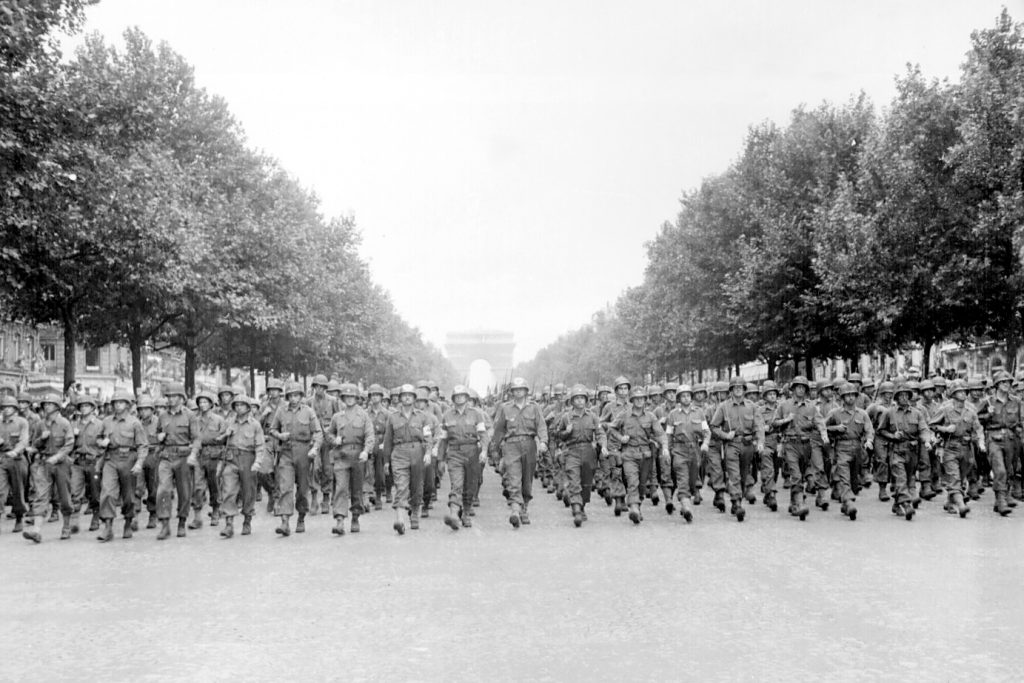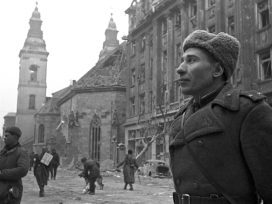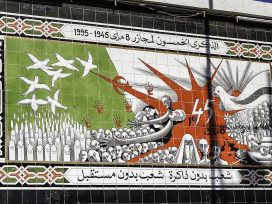For much of the second half of the twentieth century, the Second World War and its aftermath were interlaced with western Europe’s present. The war was understood to have birthed the world that emerged in its wake. This is no longer so. Our present has been uncoupled from its twentieth-century past. The Second World War has consequently lost its explanatory function for making sense of contemporary socio-political realities.
1945 used to be understood as the origin of the geopolitical order of the Cold War and the division of the continent. The democratic states that were established in western Europe after the War were shaped by a range of institutional structures and policies aimed at creating conditions that would obviate a repeat of the bloody experiences of the first half of the century. The notion of ‘postwar’ that gained currency towards the end of the century encapsulated a deeper sense that what came after 1945 stood in a causal relationship with the War. This interpretation was encapsulated by Tony Judt’s eponymous book, published in 2005.
Scholarly investigation of the ideas, policies and structures that led to the genocidal policies of the Third Reich prompted a range of uncomfortable questions about contemporary western European societies. If genocide, mass violence and racial persecution had not been the doing of only a tiny gang of criminals, as many states had pretended in the war’s aftermath, but had been supported and enabled by significant numbers of Germans and other Europeans, then that suggested that the present was still inhabited by the genocidaires of the past. The deeper continuities in people, ideas and institutions between the wartime and post-war eras was now placed at the heart of public debate.
Engaging with the history of the war was therefore not an intellectual pastime, but a question of real societal and political urgency that stirred popular passions. Nowhere was this more visible than in France, where the issue of state collaboration during the German occupation became central to public discussions in the last decade of the twentieth century.

American troops march down the Champs-Élysées on 29 August 1944. Image: Poinsett / Signal Corps. Source: Wikimedia Commons
This process of confronting a ‘past that does not pass away’, to use Henry Rousso’s influential phrase, reached a climax in the 1980s with the trials of Maurice Papon, a former high-ranking Vichy official responsible for the deportation of the Jewish population of Bordeaux. After resuming his career in Morocco and Algeria, Papon was appointed chief of the Paris police, in which capacity he had overseen the massacre of Algerian protestors in Paris in 1961. Despite being forced to resign in 1967 following the abduction of the Moroccan Marxist Mehdi Ben Barka, Papon had gone into politics and was a cabinet minister when the scandal broke.
Identifying the origins and dynamics, not to mention the perpetrators of racist policies and mass violence, thus came to be about emancipating the present from its dark past. While it began in the early post-war decades, this project only came to the fore fully in the 1980s and 1990s, after those who had been personally involved in the authoritarian regimes of the mid-twentieth century had ceased to occupy central positions within state structures.
In Germany, the new concern with studying the Holocaust as a subject in its own right was increasingly attached to the pseudo-psychological notion of Vergangenheitsbewältigung (‘coming to terms with the past’). This reflected a sense that to complete the process of post-war democratization, non-Jewish Germans were required to recognize and atone for the crimes of the past. With it came a novel approach towards ‘memory politics’, a concept that (like ‘postwar’) gained broad currency in the final decades of the twentieth century. The result was a state policy centred on taking responsibility for the destruction and mass suffering wrought by the Third Reich.
In other western European countries such as Belgium, Denmark, the Netherlands and France, historians had to overcome much societal resistance to excavate the extent of the collaboration and complicity during the German occupation, including that of their own state machinery in Nazi genocidal policies. The underlying impetus behind these historiographical and broader societal projects was to get Europeans to accept the uncomfortable truth that the crimes committed during the wartime period could not be projected onto others but were inherent to the gestation of European states and their societies.
Driven by strong ethical-civic rationale, the new engagement with the War was encapsulated in the rallying cry of ‘never again’ and gravitated primarily around the recognition and commemoration of different victim groups, whose distinctive experiences of persecution and suffering had often been marginalized or entirely ignored by scholars and the public. But there was also a wider preventive impulse inherent to the new societal debates around the lessons to be drawn from the war. This was the assumption that the analysis of history provided the resources for precluding a repetition of war and genocide, and for educating European citizens about how societies could inoculate themselves against authoritarian movements and the descent into genocide.
Today, this way of thinking about the Second World War has largely come to an end. The characteristic feature of our era is that the interconnectedness between the twentieth-century past and the twenty-first century present has been significantly disrupted. To be sure, western European states still practice the customary rituals of commemoration, paying tribute to the victims of the war and celebrating their heroic figures. In many countries, 1945 continues to serve as the mythical moment that re-established European nation states, and is celebrated on ‘liberation days’ across the continent. The rise of authoritarian movements, wartime collaboration and the Holocaust still play a prominent role in secondary school curricula.
But what has abated is the conviction that engagement with the history of the War can reveal an underlying truth about present-day western European states and their societies. Despite the widespread use of historical analogies to explain Donald Trump and his European allies, we inhabit a present marked by a fundamental break with the logics of the twentieth century.
This means that Second World War no longer serves to make sense of recent shifts in global politics, which represent a radical rupture with the structures of international cooperation and security installed after 1945. Nor does that date still provide the main clues for understanding how western European democracies function.
The social and political transformations triggered by the War led to a specific type of democracy. This sought to prevent the rise of authoritarian movements through the integration of different social classes and their interest groups via structures of corporatist negotiation, and through the politics of material amelioration for wider sectors of the population. This model of democracy, however, has been abandoned or, where its formal structures still endure, no longer seems to work.
This is evident in the widespread feeling amongst populations that governments no longer deliver tangible benefits. As a result, most political parties are unable to attract a mass membership and establish durable majorities. The steady advance of new populist movements intent on installing a very different type of political order is perhaps the clearest expression of how the Second World War has ceased to possess an explanatory capacity for the politics of the present.
In public debates, too, the Second World War is gradually being effaced by a new politics of history that accords centrality to the legacies of European colonialism and the experiences of its victims. Unlike in central and eastern Europe, where it continues to be central to public debate and subject to intense political contestation, the Second World War has thus become a properly historical subject in western Europe. To be sure, in recent years populist parties in states such as Italy and Germany have tried to create noise by vindicating aspects of their country’s troubled mid-twentieth century past. But despite the predictable media attention, these are not debates that still stimulate fervent public interest. Politically, the war has simply lost its power to shock.
Recognizing that the war no longer functions as the starting point for a ‘history of the present’ does not mean that engagement with it is of no value. On the contrary, the new types of questions that scholars are asking continue to be of immediate relevance. They include the significance of global entanglements and transfers during the War; the deeper mechanisms and logics that triggered mass violence and genocide; the experiences of different victim groups and their treatment in post-war societies; the ways in which ordinary people developed strategies of survival to cope with war and occupation; the intricate process of transitioning from war to peace; and the complexities of post-war reconstruction. All are subjects that resonate as full-scale war returns to the European continent.
The Second World War is still with us, then, eighty years after its termination, even if the questions it raises and the insights it affords have fundamentally changed. While no longer providing the key to the socio-political and global realities affecting western Europe today, it continues to form a major store of historical experience for Europeans seeking to understand the devastation and human suffering wrought by large-scale military conflict. Just as importantly, it can enable Europeans to identify ways to climb out of the abyss created by mass warfare, as well as to confront the difficulties of escaping its long-term legacies.







